Hey folks! Barbarella here recommending THE MORTUARY COLLECTION, which may be my favorite anthology to come out in decades. The film stars, in one of the more entertaining framing storylines in an anthology, the talented Clancy Brown as Montgomery Dark, an amalgamation of multiple horror personalities. I had the pleasure of speaking with both writer/director Ryan Spindell and actor Clancy Brown about the film. (The latter interview will go up later, so keep an eye out). Ryan bubbled with energy as we spoke, which made the interview particularly fun for me.
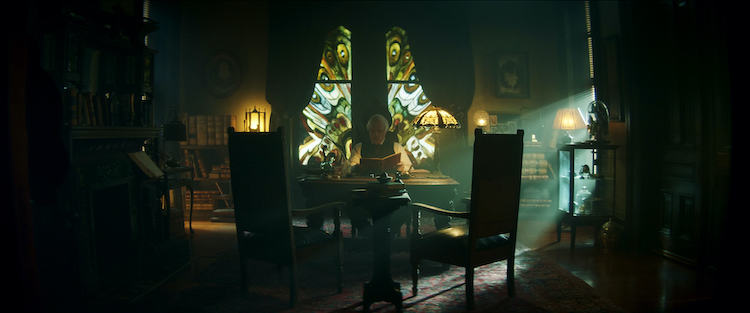
Before you met Clancy Brown, did you rehearse what you were going to say to him, and would you describe that first meeting?
“As I walked up to him in the diner, and I saw how large he was physically in person, I wished that I had planned it a bit more. It was actually amazing. I sat down, we got along really well, really quickly because he is a big genre guy, and he loves stories, and he's just such a regular blue-collar fellow. He's so easy to talk to. And so, I'm just telling him the story of the project, and I'm doing that thing where I just do run-on sentences. I'm talking and saying, "Oh, the script went around town, and nobody wanted to make it for a long time, and I just kept pushing." And as I was saying it, I did that thing where I went inside my own head, and I was like, "Don't tell him that nobody wants to make the script. You're blowing it. Stop telling him this." I course-corrected and just pushed ahead. And he did the movie.
“And then later, we were doing an interview after it came out, and somebody was like, "Oh, when did you decide you wanted to do the movie?" And he was like, "Oh, I sat down with Ryan, and he was telling me about it. He was talking about [how] he was going all over town, and nobody would make the script, and he just kept pushing. I realized that I want to work with somebody who's this passionate, that no matter what anyone says, they keep pushing forward on a project. That's the kind of director I want to work with."
“And I was like, "You never told me that! That was the moment?" And he was like, "Yeah." It just goes to show that sometimes just being genuine and pouring your heart out all over the table can work out for you. Who knew?"
He's wonderful in it.
“He's the best. He's the best.”
What did you learn from working with a seasoned pro like him?
“It's tough to say because I just think he's so easy to work with. I don't know if he's a barometer for me to use moving forward. I mean, I remember going to set and realizing his filmography and the caliber of directors that he's worked with, the biggest directors in the world, and showing up at this old Victorian house with our tiny crew for him to get his makeup put on in a bedroom upstairs. I was so nervous that he was just going to be like, "Oh, what have I gotten myself into?"
“But it was quite the opposite. He thrived in that environment, and he ended up being the keystone that kept the morale up. He was very social. Local people would come and speak to him about their love for HIGHLANDER, and he would give them a tour of the set. And we had some less-experienced actors that he took under his wing, and he would speak to people. He was just such a dream. I mean, he was in makeup for like three hours every day for no money. I mean, it's important to say that this is a scale project that he just came onto because he loved the material, and that was something I got really lucky with, but I'm not going to lean on that moving forward because I realize that he's a special case.”
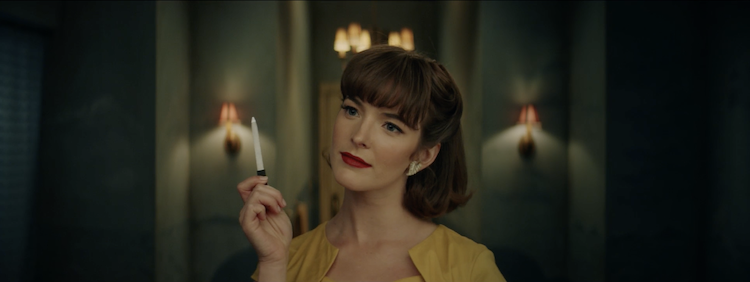
Yeah. Would you talk about what informed the design and look of the film?
“Yes. When I went to college, and I started seeing films beyond just what was in my local cinema, I became obsessed with Jean-Pierre Jeunet, and Terry Gilliam, and these auteur directors that have really rich, in-depth, bold styles. I was going to school for photography and design at the time, and so that aesthetic took all the things I've been working for my whole life and put it together. I remember watching DELICATESSEN, which is one of Jean-Pierre Jeunet's first films, and I remember thinking, "How amazing would it be if you could take this aesthetic, but put it into a horror package, create horror films with this kind of beautiful, rich, fantastic aesthetic?" And then Guillermo del Toro basically did exactly that, and he pretty much got the market on it now.
“So, I'm scrambling to catch up, but I just love that sort of horror/fantasy aesthetic, the timeless quality. To me, it's a reflection of what the best horror stories are, which are morality tales or creepy stories that aren't set in any one time and place, but they are eternal. I think there's something beautiful about that.”
Which is your favorite story in the anthology and why?
“You can't ask me to pick my favorite child.”
(Laughing) Sure I can.
“First and foremost, I genuinely love them all equally. I think my tastes as a fan probably lean a little bit more towards “'Til Death” and “The Babysitter Murders,” but in a way, each story represents a different portion of the genre, which I love. So, the opening has a “Goosebumps,” easy, fun, horror/fantasy vibe, which is how I found my way into the genre space. And then “The Medicine Cabinet” ups the ante a bit more with a little bit of a “Twilight Zone” twist, but it's still fairly safe and fairly neutral. And then we evolve into “Unprotected.” That's a little bit more character driven, a little bit more grizzly, but there's a humor to it. And then “'Til Death,” in which the morality becomes a bit more gray and a little bit darker. And then I think that in a way, “The Babysitter Murders” is representative of modern horror, of revisionist horror, in which we know the tropes so well that we use them to subvert expectations. I somehow egotistically created my entire love of the genre within the space of one feature film, which now that I'm saying out loud sounds really pretentious.”
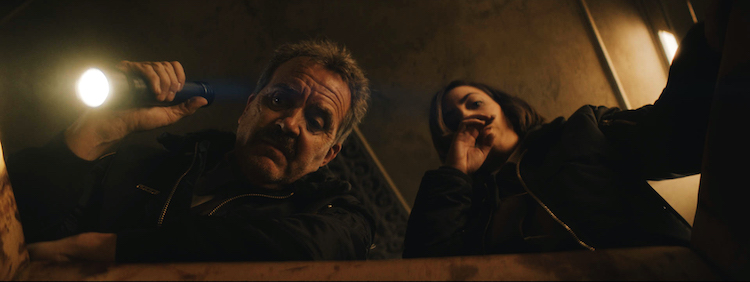
You have a lot more of these stories, right? Are you going to do another anthology?
“I hope so. I have so many of these stories. I have twelve of them on my computer right now, ready to go. Yeah, looking to potentially turn this into a series or a sequel.”
Ooh.
“I think it just is going to depend on the audience and if there's a need for it. I think if people want it enough, maybe somebody will let us do it.”
Right. If you could change anything about yourself, what would you change and why?
“Whoa. Just throw in the crazy curve ball.”
(Laughing) I got to do that sometimes.
“I think this is probably a common thing for creatives and filmmakers, especially. I'm always worried that I'm not doing enough. I worry that I'm not pushing myself hard enough, that I'm not exploring all avenues I could be to create things and bring them to the screen, because movies like THE MORTUARY COLLECTION take so much time and so much creative and emotional energy to realize. So, I think if I could change something about myself, I would probably go easier on myself.”
I think that's actually a very common thing, Ryan. I think we're all too hard on ourselves.
“That’s true. We are.”
We are. What was the most unexpected obstacle to making this, and how did you get past it?
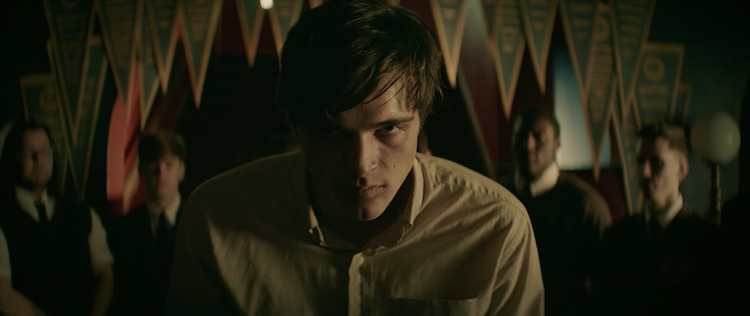
“Well, I think because I've done so many shorts in the past, the idea of making a movie composed of shorts seemed very manageable because I was like, "Oh, I just have to do what I've done before five times." But what I hadn't really taken into consideration is that whenever I'd done a short before, I do it, and then I have six months to a year to finalize it and submit it to festivals and do the run.
“Once we started going into production, I realized making five stories at one time is an incredibly, incredibly difficult and tricky thing, both logistically, because you have new sets of actors, new effects gags, new locations, new everything every time, but also just creatively because I had to keep my brain in sync with each of the storylines and each of the characters. And, of course, it's an independent film, so things are changing quickly. We’re rewriting scenes the morning of, and it's just like this constant Jenga puzzle that you're trying to move around in your brain. At some point, you just have to let Jesus take the wheel and step back and hope when you get to the editing room, it all works. But I definitely wouldn't suggest, at least for your first film, trying to do five films at one time. I'd stick to one, if possible.”
Yeah. That's pretty ambitious. What was the most memorable part of making this, and why was it so memorable?
“We shot all the stuff with Clancy and all of the exterior stuff in this little town on the coast in Oregon called Astoria. It’s where they shot the exteriors for THE GOONIES. Just being in that little, sleepy, foggy, Victorian town on the ocean felt like living in Raven's End. For two months, I was living and breathing the atmosphere there, and I think it really comes through in the film in a really specific and cool way that I don't think I ever would have anticipated had we tried to pull it off in Los Angeles with visual effects and such.”
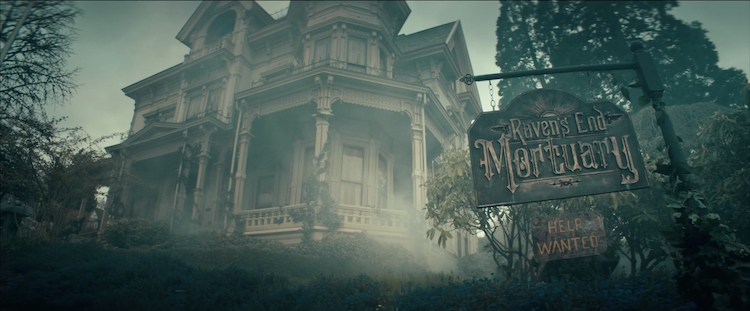
I think once audiences experience what Ryan Spindell has accomplished here with THE MORTUARY COLLECTION, they would agree that we need to see many more of his short films. I’m hoping that a series emerges from this because I, for one, would definitely watch it.
If you want to check it out, THE MORTUARY COLLECTION will be available on VOD, Digital, DVD and Blu-ray April 20,2021. Check back later for my interview with Clancy Brown. In the meantime, here's the trailer.
Barbarella
